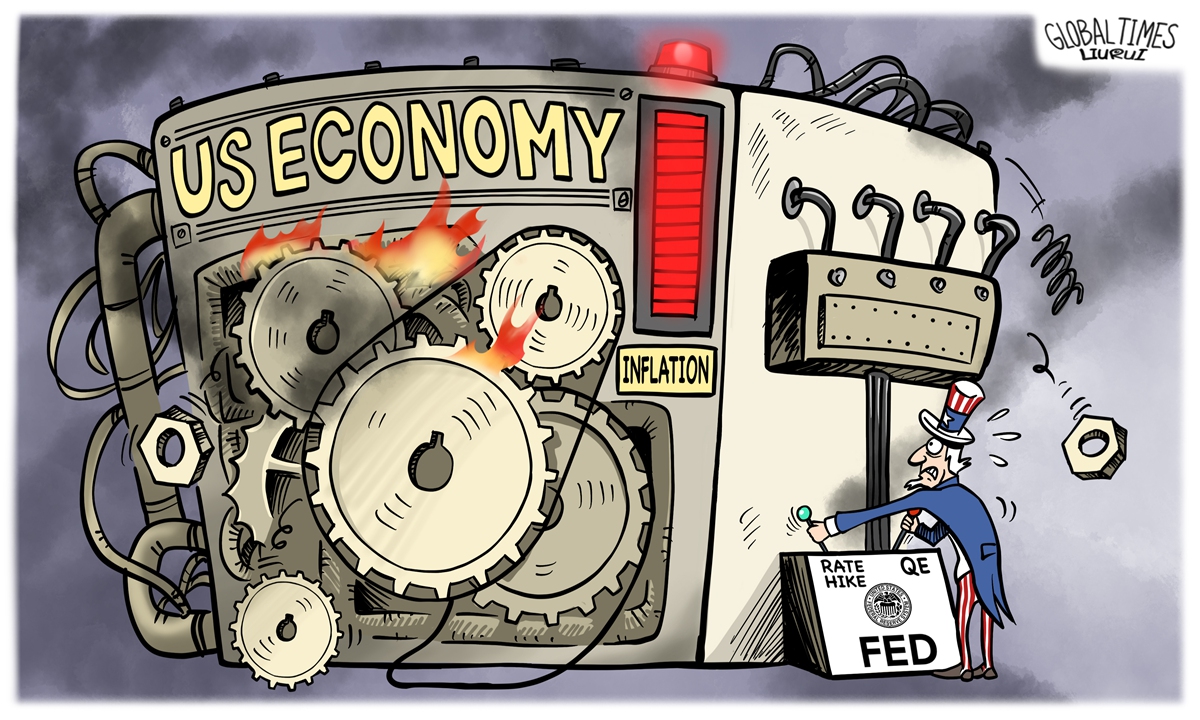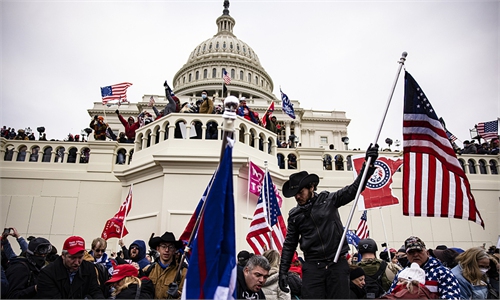China releases report revealing US’ striking economic polarization
Problem further exacerbated by COVID, continues to tear apart society

US economy Illustration: Liu Rui/GT
China released a report on the truth and facts behind the growing economic polarization in the US, revealing that the problem is so prominent that 1 percent of US households hold more than 20 percent of national household wealth. The problem has been exacerbated by COVID-19 and other factors, and continues to pull at the fabric of US society.
The report, Rising Economic Polarization in the US: Truth and Facts, was published by the Xinhua News Agency on Thursday, highlighting some striking facts behind the US' widening wealth gap. According to World Bank, the Gini coefficient, which measures inequality in income distribution, in the US has gone up from 0.353 in 1974 to 0.415 in 2019, exceeding the warning level of 0.4, which indicates a large income gap.
The problem was further exacerbated by the onslaught of COVID-19, when economic recession led to massive job losses and further deterioration in the economic situation of low-income earners. At the same time, excessive money supply and large-scale fiscal spending have driven up stock and housing prices, bringing enormous benefits to wealthier asset owners.
The Xinhua report cited a Fed report on household wealth, saying the total wealth of the richest 1 percent reached a record $45.9 trillion at the end of the fourth quarter of 2021, and their fortunes increased by more than $12 trillion, or more than a third, during the course of the pandemic.
The widening wealth gap has also led to the middle class shrinking. Fortune magazine reported in November 2022 that 61 percent of US adults were considered middle class in 1971, a figure that dropped to just 50 percent in 2021, according to an analysis from Pew Research Center. Fewer Americans consider themselves to be middle class than before the Great Recession.
The shrinking of the middle class has also led to tense relations between different races in the US, as the middle class, which is mostly made up of white Americans, believe other races' improvement is based on sacrifices made by white Americans, thus fuelling their anger, Li Haidong, a professor at the Institute of International Relations at the China Foreign Affairs University, told the Global Times.
The problem has led to growing populism in the US, created antagonism between different race groups and thus given a platform to extreme politicians who advocate a toxic form of populism, and led to an increase in cases of extreme violence, according to Li.
The report from Xinhua also pointed out that the widening wealth gap is one of the main causes of the deepening social crisis in the US. Problems including growing ethnic conflicts, increasing homelessness, urban riots and violent crimes are all closely related to it.
Due to the increasing polarization between rich and poor, the US has witnessed frequent demonstrations in recent years. From the Occupy Wall Street movement in 2011 to the Black Lives Matter protests against police violence in the US in 2020, some demonstrations have even turned violent.
According to the US Census Bureau, 82 percent of 18- to 24-year-olds from high-income families have gone to college, compared with just 45 percent of those from low-income families. A report by the US Department of Housing and Urban Development showed that more than 580,000 people were homeless in 2020, with 226,000 sleeping outside, in cars or in abandoned buildings.
Despite facing such a dire situation, US politicians are doing very little to change their people's lives. Partisan conflict and constant changes in government have led to flip-flops in US policies.
While tax policy plays an important role in narrowing down the wealth gap, the rivalry between Democrats and Republicans on taxation has resulted in a failure to effectively tax the rich, who have tried every possible mean to "legally" avoid paying their dues.
According to a report by the news outlet ProPublica, the true tax rate of the richest Americans is only 3.4 percent, far lower than that of ordinary wage earners.
In general, the US is facing a "blackout" of its national identity, its economy is being hollowed out, its society thrown into chaos, and politics is going to extremes, said Li, noting that COVID-19 has also fueled the American crisis.
What makes the situation worse is that the hostility between the two main parties has grown sharper, and this antagonism will exist on the US political map for the long term, which means the crisis in the country will only be further exacerbated, and it will be very difficult for the country to go back to normal, said Li.

